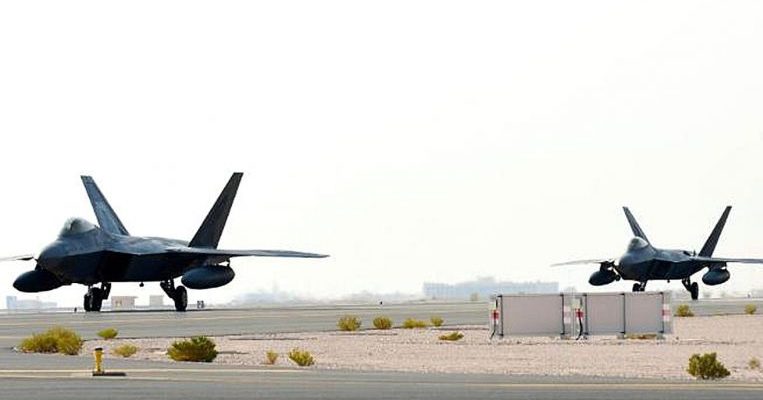
WASHINGTON • The United States has deployed F-22 stealth fighters to Qatar for the first time, its military said, adding to a build-up of American forces in the Gulf amid tensions with Iran.
The Air Force F-22 Raptor stealth fighters have been deployed “to defend American forces and interests”, the US Air Forces Central Military Command said in a statement that did not specify how many of the high-tech planes had been sent.
A photo handout showed five of the jets flying above Al Udeid Air Base in Qatar.
Teheran and Washington have been locked in an escalating standoff since US President Donald Trump unilaterally withdrew from a multi-party 2015 nuclear deal with Iran and reimposed sanctions on the Islamic republic.
Tensions spiked after Iran shot down a US drone over sensitive Gulf waters on June 20 following a series of tanker attacks that Washington blamed on Teheran, which has denied involvement.
Since then, the arch-foes have been locked in a war of words, which escalated last week when Mr Trump announced new sanctions against Iran’s Supreme Leader, Ayatollah Ali Khamenei, and Foreign Minister Mohammad Javad Zarif.
Iran has threatened to abandon some of its commitments under the nuclear deal unless the remaining partners – Britain, China, France, Germany and Russia – help it circumvent US sanctions and especially sell its oil.
The US is trying to rally countries to its side at the United Nations, where most members blame President Donald Trump’s administration for stoking tensions by abandoning the multinational nuclear deal with Iran last year and applying renewed sanctions on the Iranian economy.
Last month, the US Air Force deployed several nuclear-capable B-52 Stratofortress bombers to the Gulf in response to what the Defence Department described as a possible plan by Iran to attack American forces in the region, as well as an aircraft carrier task force.
At the Group of 20 (G-20) summit in Osaka, with tensions spiralling in the Gulf, Iran was expected to be a key focus at the summit and bilateral meetings. But it was barely mentioned, with Mr Trump instead stealing the show in a surprise tweet on North Korea.
After Mr Trump met Saudi Arabia’s Crown Prince Mohammed bin Salman on the sidelines of the G-20 meeting yesterday, the White House said in a Twitter post that Mr Trump and the prince “discussed Iran’s heightened aggression”.
“Both leaders are committed to maintaining a strong international oil market in the face of Iran’s behaviour,” it said.
The US is trying to rally countries to its side at the United Nations, where most members blame Mr Trump’s administration for stoking tensions by abandoning the multinational nuclear deal with Iran last year and applying renewed sanctions on the Iranian economy.
Meanwhile on Friday, the US special representative for Iran said European companies have a choice: Do business with the United States, or do business with Iran, as Europe announced that a new system to allow trade with Teheran was in place.
The comments by Mr Brian Hook came as European countries made a last-ditch effort to prevent Iran from breaching the terms of the 2015 nuclear deal, a move that could add to soaring tensions in the Persian Gulf.
Europe has been scrambling to come up with a mechanism to persuade Iran to stay within the limits of the deal, as Teheran complains that it no longer sees the economic benefits of the accord after the Trump administration pulled out of the deal and reimposed sanctions on the nation.
Iran has indicated that if it does not receive some form of sanctions relief, it plans to exceed a limit of 300kg of low-enriched uranium that the country is allowed to possess under the nuclear agreement.
That threat added urgency to efforts by Britain, France and Germany to set up a complex barter system that would allow some trade with Iran to continue in order to keep Teheran from breaching the deal.
The system is now operational, and the first transactions are being processed, senior European Union diplomat Helga Schmid said after a meeting of officials from the remaining EU signatories in Vienna on Friday. She said she expected more EU countries to join.
European officials argue that maintaining the deal is crucial for regional stability.
It is unclear if the European efforts to set up an alternative trading system to persuade Iran to stay within the deal’s stockpile limits will work. The key test – of whether the barter system can actually succeed in processing a transaction – remains.
Iran’s Deputy Foreign Minister Abbas Araghchi described the development as “positive” but said there is still a “gap” with Iran’s expectations under the deal, which include the ability to sell oil. Teheran will study the development and make a decision on how to proceed, he said.
AGENCE FRANCE-PRESSE, WASHINGTON POST
